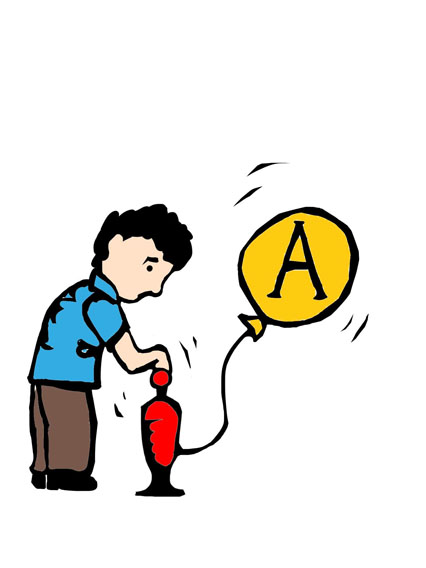Over the past decade, secondary schools in the U.S. have implemented grade inflation—the practice of giving higher grades for work that would have earned a lower grade in the past.
Four years ago, we saw the three-point curve for Honors classes added on to the various forms of grade inflation—the five-point curve for AP classes, extra credit and the typical bell curve. Schools implemented grade inflation to improve college prospects as more public schools started doing so as well.
As a part of the goal of education, the purpose of grades is to motivate students to master concepts and demonstrate knowledge. Although grade inflation is a nice policy, it fails to achieve the fundamental purpose of education.
Grade inflation, particularly in the form of curves, can also deteriorate the work ethic of students.
“Although it’s embarrassing to admit, I have definitely worked less diligently in some classes because of grading curves,” senior Arvind Raju said. “In the classes that interest me, I tend to learn the material because I find it engaging, but for the other classes, my primary interest is getting a good grade, and grade inflation makes it much easier to just coast through the material.”
Teachers and administrators tend to believe that wanting to learn, rather than wanting to get a good grade, motivates students.
“I don’t think Trinity students, as a whole, are students who are looking strictly at numbers or grades,” Curriculum Director Kathy Pinson said. “I believe they are truly intellectually curious.”
Although this mindset is ideal, I have seen many students driven by how much work they need to put into a class to receive an A or A+.
“[Before the final exam,] my grade in AP Economics was fortunately high enough to stay a consistent A+, so my focus on studying for that course shifted,” senior Mathew Pregasen said.
If most of us are intellectually curious without grades, why do most seniors get senioritis? In addition, grade inflation prevents any discrepancies between those who mastered the subject and those who just cruise by.
“There is a huge difference between someone who gets a 100% and a 70% on a test,” senior Ryan Hopkins said. “But, because of the large curve, they each get the same grade of 100%. The person who truly got a 100% mastered the material, while the other did not.”
Because we receive a letter grade, rather than a percentage, grade inflation provides very little information about the mastery of subjects. Curves and extra credit cause false perceptions of ability, which could eventually harm students in the future. For instance, as the Atlantic Insitute for Market Studies explains, schools in the Atlantic Canada region showed lower standardized provincial test scores as schools started implementing grade inflation. Likewise, according to school profiles, un-weighted GPAs at Trinity have been generally increasing while SAT scores remain almost unchanged. However, because the Class of 2014 was the first group to undergo the three-point curve along with other forms of grade inflation, we have yet to see all of the effects.
Furthermore, grade inflation erodes the value of grades, especially A’s. If the majority of students receive an A in a class, no one knows who truly mastered the material. Only the exceptional students should be earning A’s. As the rigor of courses has not increased with the grading curves, students are then receiving higher grades for less work.
“There was a fear that some teachers would crank up the intensity with the three-point curve for Honors courses. But, I don’t think any teachers have changed the way they taught for the most part,” chemistry teacher William Personette said. “But I think it has resulted in higher grades across the board.”
Because rigor has remained unchanged, past students who took non-grade inflated classes are at a disadvantage, while the extremely high achieving students are not properly rewarded or recognized.
“In AP classes, grade inflation seems pretty unfair to students who put in the extra work and achieved grades four or five points higher than mine, yet reached the same grade,” Raju said.
Furthermore, college acceptances are not necessarily better because of grades, and inflated scores could instead prompt unprepared students to get into certain colleges.
Considered to be one of the best boarding schools in the nation, the Trinity School in New York City did not have a single student with a perfect GPA last year, yet 41% of their alumni go to MIT/Stanford/Ivy schools.
Unfortunately, in general, the grade inflation problem continues to increase as students often recognize teachers who practice such policies and request them.
By eliminating curves or even radically changing to a percentage system, students are more likely to work harder and be rewarded accordingly.
Although everyone’s grades have benefited from grade inflation, we should re-evaluate the grade inflation policy from an objective, educational standpoint.
As grade inflation continues to swell each year, the bubble might soon be on the verge of bursting.





